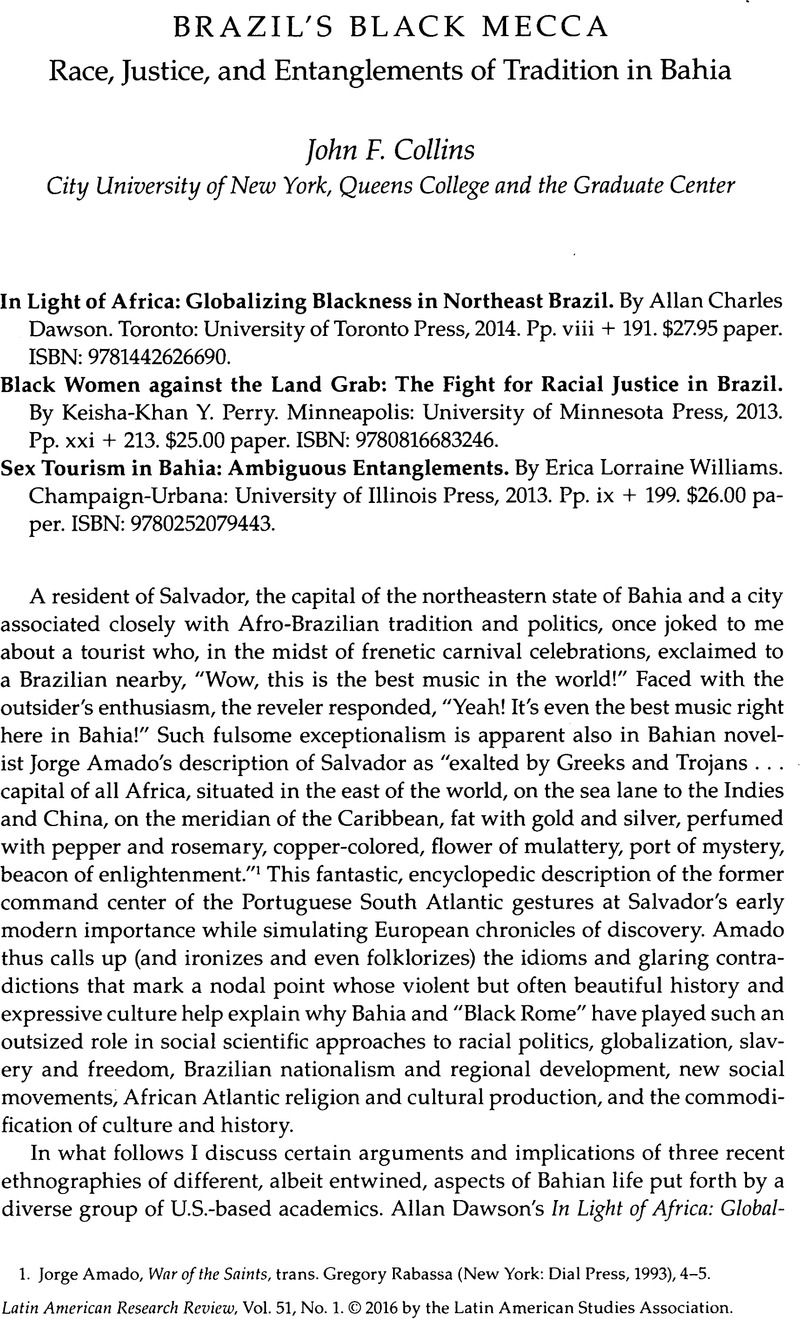No CrossRef data available.
Published online by Cambridge University Press: 05 September 2022

1. Jorge Amado, War of the Saints, trans. Gregory Rabassa (New York: Dial Press, 1993), 4-5.
2. Melville Herskovits, The Myth of the Negro Past (New York: Harper, 1941); Sidney Mintz and Richard Price, An Anthropological Approach to the Afro-American Past: A Caribbean Perspective (Philadelphia: Institute for the Study of Human Issues, 1976); and J. Lorand Matory, Black Atlantic Religion: Tradition, Transnationalism, and Matriarchy in the Afro-Brazilian Candomblé (Princeton, NJ: Princeton University Press, 2005).
3. For an overview of the UNESCO race relations project and Brazilian social science, see especially Marcos Chor Maio, “O projeto UNESCO e a agenda das ciências sociais no Brasil dos anos 40 e 50,” Revista Brasileira de Ciências Sociais 44 (1999): 141-158.
4. John Burdick, “The Catholic Afro Mass and the Dance of Eurocentrism in Brazil,” in Race, Nation and Religion in the Americas, edited by Henry Goldschmidt and Elizabeth McAlister, 111-130 (New York: Oxford University Press, 2004).
5. Kamala Visweswaran, Fictions of Feminist Ethnography (Minneapolis: University of Minnesota Press, 1994). In the diaspora approach drawn on by Perry, “Black and/or Africana Studies is concerned with Black collectivity, Black positioning in relation to power and social hierarchy, and Black agency regardless of national or other boundaries imposed upon us” (Edmund Gordon, “The Austin School Manifesto: An Approach to the Black or African Diaspora,” Cultural Dynamics 19, no. 1 [2007]: 93).
6. See John Collins, “‘X Marks the Future of Brazil’: Racial Politics, Bedeviling Mixtures and Protestant Ethics in a Brazilian Cultural Heritage Center,” in Off Stage/On Display: Intimacies and Ethnographies in the Age of Public Culture, ed. Andrew Shryock, 191-224 (Stanford, CA: Stanford University Press, 2004).
7. See Michael Hanchard, Orpheus and Power: The Movimento Negro of Rio de Janeiro and São Paulo, Brazil, 1945-1988 (Princeton, NJ: Princeton University Press, 1994), for a discussion in English of critiques of Bahian culturalism.
8. Jean Rahier and Percy Hintzen, “Theorizing the African Diaspora,” in Global Circuits of Blackness: Interrogating the African Diaspora (Urbana: University of Illinois Press, 2010), xviii.
9. For a relational approach to issues of race, sexuality, and morality that arise in the interface between Afro-Brazilian domestic workers and their employers, see especially Donna Goldstein, Laughter Out of Place: Race, Class, Violence and Sexuality in a Rio Shantytown (Berkeley: University of California Press, 2005).
10. See for example Ann Stoler, Carnal Knowledge and Imperial Power: Race and the Intimate in Colonial Rule (Berkeley: University of California Press, 2002).
11. Donna Guy, Sex and Danger in Buenos Aires (Lincoln: University of Nebraska Press, 1991); Margareth Rago, Os prazeres da noite: Prostituição e códigos da sexualidade feminina em São Paulo (1890-1930) (Rio de Janeiro: Paz e Terra, 1991).
12. See Kim D. Butler, “Africa in the Reinvention of Nineteenth Century Afro-Bahian Identity,” Slavery and Abolition 22, no. 1 (2001): 135-154.
13. Hebe Mattos, Das cores do silêncio (Rio de Janeiro: Arquivo Nacional, 1998); and Marta Abreu and Hebe Mattos, “‘Remanescentes das comunidades dos quilombos’: Memória do cativeiro, patrimônio cultural e direito á reparação,” Revista Iberoamericana 42 (2011): 147-160.